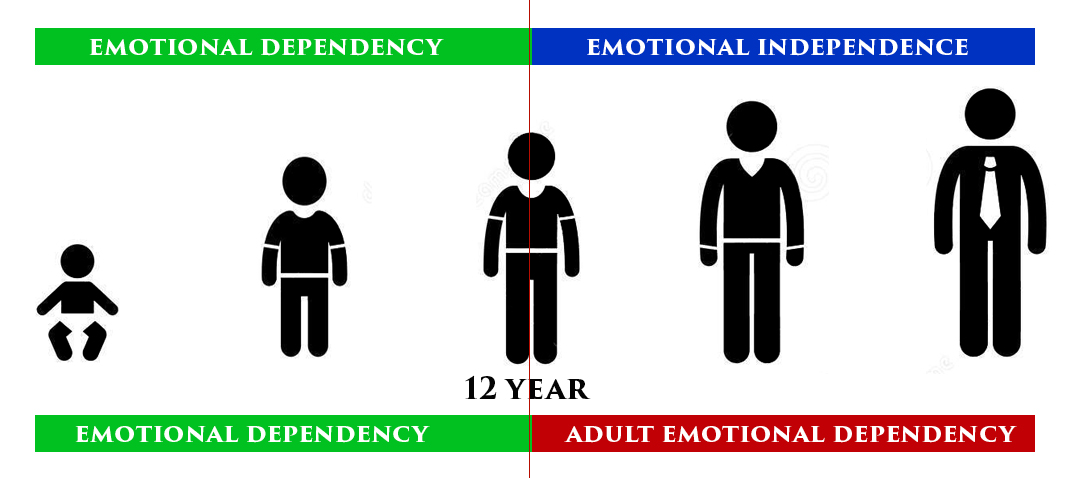Adult Emotional Dependency (AED) is a recently discovered mental condition, caused by the abnormal continuation in adulthood of Emotional Dependency.
The condition seems to affect a large segment of our actual society and has shown to be the hidden root-cause of many forms of anxiety and fear. Some of the conditions associated with Adult Emotional Dependency (AED) are: generalized anxiety, unjustified feeling of unsafe, fear of judgement and rejection, need for approval, confidence issues, performance anxiety, social anxiety, starvation for love and attention, depression, alcohol and drugs abuse, addictions, feeling overwhelmed and tired, neediness or emotional numbness, poor performance and much more…
Adult Emotional Dependency (AED) symptoms
Our human nature is to become self-reliant and emotionally independent in adulthood. Emotionally independent individuals are able to interact freely and comfortably with partners, families, friends and community – from a place of equality and personal empowerment. This allows us to be socially inter-dependent, the ability to interact and share our lives with people by free choice – not constrained by fear and need.
On the contrary, emotional dependency in adulthood builds complex and painful layers of anxiety and fear and typically results in several debilitating emotions/feelings. Adult Emotional Dependency (AED) is the cause of the symptoms related to being emotionally dependent in adulthood upon ‘others’ (peers, colleagues, friends, family, partners, social environment – not necessarily upon a specific person – as source of protection, approval, leadership and emotional fulfillment. These may include:
Fear of:
- Judgment
- Rejection
- Abandonment
Belief in the need for:
- External leadership and/or validation
- Over-giving to be a ‘pleaser’
- Accepting abuse to get affection
Feelings of:
- Self-doubt
- Neediness and self-focus
- Inadequacy
- Social anxiety
- Chronic insecurity
- Lacking an identity
- Being a fraud and a failure
- Being a child in a world of adults
- Resentment for the lack of external leadership and support
Emotional dependency throughout adult life creates:
- Anxiety
- Stress
- Addictions
- Feeling overwhelmed and tired
- Depression
- Dependency in relationships
- Starvation for love and attention
- Loneliness and solitude
- Loss of spirit-mind connection
- Panic attacks
- Chronic anger
- Unwarranted fears
- An inferiority complex
- Antisocial tendencies
- Emotional and spiritual numbness
- Borderline personality
- Unsuccessful personal life and relationships
- Unfulfilled artistic and professional aspirations
Because anxiety and fear use a large amount of brain resources, Adult Emotional Dependency (AED) massively overwhelms our brainpower thereby reducing our overall performance in every aspect of life, work, school and sport.
How to terminate Adult Emotional Dependency (AED)
Adult Emotional Dependency (AED) terminates only if Emotional Self-Reliance is implemented. As soon the missing parental self-reliance models are acquired, Adult Emotional Dependency (AED) ceases and the connected emotional consequences are cleared. The emotional freedom produced by the termination of Adult Emotional Dependency (AED) , provides the ability to transform the needs produced by dependency to the autonomy of choice offered by interdependency; it also frees all the brainpower misused by Adult Emotional Dependency (AED) , which becomes available for high-performance, creativity and happiness.
A fast and natural solution to terminate Adult Emotional Dependency (AED) is offered by the Mind Fitness program. A proven program that helps conquer emotional independence, release traumas and clear all unwanted layers of anxiety and fear. By clearing your mind and making inefficient behaviors built around dependency obsolete, your mind will redirect your brainpower towards creating efficient behaviors, performance, self-confidence, efficiency, clarity, and happiness.
The Mind Fitness program provides an emotional framework that mimics the parental models needed to provide the confidence of self-leadership. Once the framework is in-place and the capacity for self-reliance is engaged, Mind Fitness guides and trains your mind to clear away unwanted layers of anxiety and fears.
Within a couple of weeks of completing the program, daily feelings of isolation created by dependency are transformed into the ability to relate comfortably and inter-dependently, through the prism of choice and not need, with others. The effect is staggering – the isolation created by dependency is transformed to enjoyable inter-dependent relationships with others – where you finally see and enjoy the world around you without anxiety or fears, acting by choice instead of need. Obsolete behaviors built around dependency thus disappear – allowing the mind to redirect the reclaimed brainpower and use it to achieve higher levels of performance, efficiency and happiness in every area of your life.
Terminate Adult Emotional Dependency (AED) will allow you to:
- Become emotionally self-sufficient and independent.
- Transform dependency to interdependency.
- Enhance strengths and confidence – establishing leadership in the professional and personal life.
- Clear the real cause of addictions – taking control over life’s events.
- Manage successfully thoughts, feelings and emotions.
- Enhance creative, academic, artistic and athletic performances.
- Spark attraction – experiencing fulfilling, happy and balanced relationships.
- Clear procrastination, getting things done – achieving life-long goals.
- Free your natural powers – gaining efficiency and success in every aspects of life.
- Establish an efficient spirit-mind alignment – accessing unconditional happiness.
- Fully capitalize on the therapeutic and self-development work done in the past, and the future efforts invested in personal development.
Adult Emotional Dependency (AED)
We are born with the tools needed to become emotionally mature and self-reliant as we move from childhood into young adulthood. During our childhood these tools remain undeveloped and/or dormant, causing us to be dependent on our parents or guardians. As we approach puberty our natural need for self-leadership and emotional independence begin to awaken with the purpose of converting our relationships from dependent to independent. The level of success we achieve in our transition to emotional independence is determined by the life-models we learned from our parents.
Though this is Nature’s plan, it frequently fails because our parents and/or guardians have not achieved emotional independence themselves, so they cannot model and teach these essential life skills to their children. Without proper emotional self-reliant education, the young adult doesn’t own the necessary awareness and tools required to reach emotional independence. Thus, this ensures Emotional Dependency stays active after puberty, transferring the compelling need for leadership, love, safety, validation and guidance from ‘parents’ to ‘others’, i.e. friends, partners, colleagues, social environment, and may carry on through the entire life. This is the condition defined as Adult Emotional Dependency (AED).

Emotional Dependency in childhood
Emotional Dependency is an instinctual behavior, hardcoded in our mind to protect and stimulate our emotional development during childhood. Its main function is to compel children to gain parental protection, guidance and emotional fulfillment.
Emotional Dependency uses powerful emotions to induce a child to seek:
- Safety – seeking protection upon adults.
- Mental development – seeking leadership validation and guidance.
- Emotional fulfillment – seeking love and care.
Emotional Dependency starts at birth and is supposed to terminate just before puberty. This is when young adults are meant to enter the phase of emotional self-reliance, shifting the fulfillment of their emotional needs from parents to themselves. Young adults terminate their Emotional Dependency using models of self-reliance learned from parents and caretakers.
If young adults are unable to embrace their own emotional fulfillment, Emotional Dependency remains active in adulthood, shifting the fulfillment of their emotional needs from parents to ‘others’. This defines the devastating condition named Adult Emotional Dependency (AED).
